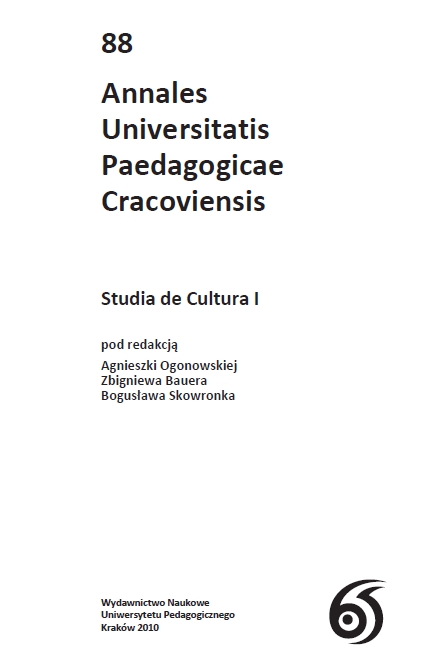Abstrakt
Web 2.0: between wikinomia and counterculture: Facebook
The article elaborates on discursive and commercial strategies of Facebook, aimed at incorporating any criticisms and discontent from its users within discussion groups formed at Facebook itself. Two major campaigns to overthrow and reject changes put forward by the service's management have been presented as micro case studies; the campaigns resulted in implementing the Facebook Statement of Rights and Responsibilities, a quasi-democratic set of rules worked out with the users over a few weeks when voting procedures were introduced to accept the rules. Such a strategy - along with an open API policy and drawing a number of small companies specializing in providing Facebook-related applications and games - can be one of the sources of Facebook's global success. Comparison is drawn with Polish social networking site, Nasza-klasa (currently nk.pl), which communicates with its users in a much more one-direction, top-bottom way. Such strategy is clearly designed rather to overcome criticism from the users than to accommodate it (to boost emotional investments from them). The bottom line, though, is the fact that Facebook, as a social networking site capitalizing on the circulation of data generated by its users, advantages from any heated discussion among them, as long as it is kept within borders of Facebook and held under its logo.
Bibliografia
Aarseth E. (1997), Cybertext. Perspectives on Ergodic Literature, Baltimore–London: John Hopkins University Press.
Zobacz w Google Scholar
Arango T., Stelter B. (2009), „Losing Popularity Contest, MySpace Tries a Makeover”, „New York Times”, 3.05.wersja online: http://www.nytimes.com/2009/05/04/technology/companies/04myspace.html [15.09.2009].
Zobacz w Google Scholar
Applebome P. (2004), „On Campus, Hanging Out by Logging In”, New York Times 1.12.2004, wersja online: http://www.nytimes.com/2004/12/01/nyregion/01towns.html?scp=2&sq=Facebook&st=nyt [10.08.2009].
Zobacz w Google Scholar
Dijk van I. (2009), „Users Like You? Theorizing Agency in User-generated Content”, „Media, Culture&Society” 31.
Zobacz w Google Scholar
Domaszewicz Z. (2006), „Web 2.0 to rewolucja w Internecie?”, http://gospodarka.gazeta.pl/gospodarka/1,68367,3196659.html [20.10.2008].
Zobacz w Google Scholar
Galloway A. (2004), Protocol. How Control Exists After Decentralization, Cambridge: MIT Press.
Zobacz w Google Scholar
Galloway A., Thacker E. (2007), The Exploit. A Theory of Networks, Minneapolis: University of Minnesota Press.
Zobacz w Google Scholar
Lenhart A. (2009), „Adults and Social Network Websites”, Pew Internet & American Life Project, wersja online: http://www.pewinternet.org/Reports/2009/Adults-and-Social-Network-Websites.aspx [18.10.2009].
Zobacz w Google Scholar
Manovich L. (2008), Software Takes Command, wersja elektroniczna z 20.11.2008, http://www.softwarestudies.com.softbook [2.12.2008].
Zobacz w Google Scholar
Miller C.C. (2009), „Who’s Driving Twitter Popularity? Not Tweens”, New York Times, 25.08.2009, wersja online: http://www.nytimes.com/2009/08/26/technology/internet/26twitter.html?_r=1&th&emc=th [5.09.2009].
Zobacz w Google Scholar
Nacher A. (2009), „Projektowanie jako negocjacja – między dominacją kodu a ekstazą partycypacji”, „Kultura Współczesna” 3(61).
Zobacz w Google Scholar
Parr B. (2009), „The Facebook Democracy: How It Will Affect You?”, „Mashable – The Social Media Guide”, 24. kwietnia 2009, http://mashable.com/2009/04/05/facebook-democracy/ [8.09.2009].
Zobacz w Google Scholar
Schäfer M.T. (2008), Bastard Culture! User Participation and the Extension of Culture. rozprawa doktorska, publikacja elektroniczna http://www.mtschaefer.net/entry/defending-mybastard-culture/ [23.11.2008].
Zobacz w Google Scholar
Siklos R. (2006), „Virtual World but Real Money”, „New York Times”, 19.10.2006, wersja online: http://www.nytimes.com/2006/10/19/technology/19virtual.html?pagewanted=1&_r=1&sq=Linden%20Lab&st=Search&scp=13 [10.09.2009].
Zobacz w Google Scholar
Tapscot D., Williams A.D. (2008), Wikinomia. O globalnej współpracy, która zmienia wszystko, Warszawa: Wydawnictwa Akademickie i Profesjonalne.
Zobacz w Google Scholar
Zuckerberg M. (2006), „An Open Letter from Mark Zuckerberg”, http://blog.facebook.com/blog.php?post=2208562130 [10.09.2009].
Zobacz w Google Scholar
Zuckerberg M. (2009), „On Facebook, People Own and Control Their Information” http://blog.facebook.com/blog.php?post=54434097130 [12.09.2009].
Zobacz w Google Scholar
Zuckerberg M. (2009b), „Governing the Facebook Service in an Open and Transparent Way” http://blog.facebook.com/blog.php?post=56566967130 [12.09.2009].
Zobacz w Google Scholar
Facebook Principles: http://www.facebook.com/terms.php?ref=pf#/principles.php [5.09.2009].
Zobacz w Google Scholar
Facebook Statement of Rights and Responsabilities: http://www.facebook.com/terms.php?ref=pf#/principles.php [5.09.2009].
Zobacz w Google Scholar
Archiwum listy mailingowej Association of Internet Researchers, http://listserv.aoir.org/pipermail/air-l-aoir.org/
Zobacz w Google Scholar
Facebook, 2009
Zobacz w Google Scholar
Facebook, 2009c http://www.facebook.com/group.php?gid=2208601394
Zobacz w Google Scholar

Utwór dostępny jest na licencji Creative Commons Uznanie autorstwa – Użycie niekomercyjne 4.0 Międzynarodowe.
Prawa autorskie (c) 2023 Annales Universitatis Paedagogicae Cracoviensis | Studia de Cultura

